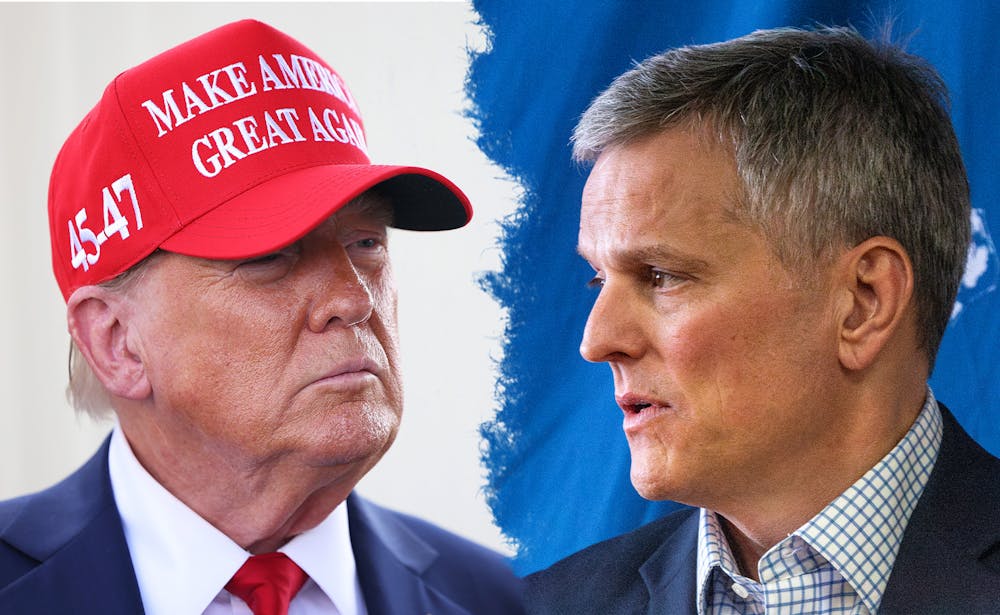Split-ticket voting occurs when an individual chooses candidates from different political parties for different races on the same ballot.
In the 2024 election, North Carolina upheld its tradition of split-ticket voting, mirroring the results of 2016 and 2020, where North Carolina voted for a Republican president and a Democratic governor. A similar pattern occurred in Nevada, Arizona, Wisconsin and Michigan where Donald Trump was awarded the electoral college votes for the state, but a Democratic senator won the state.
According to data from Gallup, political independents now constitute the largest political bloc in the country, with an average of 43% of U.S. adults identifying as independent in 2023, tying the record high from 2014.
Steven Greene, a professor of political science at North Carolina State University, sat down with Elon News Network to discuss the revival of split-ticket voting in the 2024 elections. From North Carolina's history of divided voting for president and governor to the potential influence of independent voters, Greene provides insights into how this electoral behavior shaped outcomes at both state and national levels.
This interview was edited for clarity.
What is split ticket voting and what is its impact in North Carolina?
It's when you vote for a candidate of one party at we'll call the top of the ticket, such as for president and then vote for a different candidate, or candidates for other positions, such as voting for Donald Trump for president and Josh Stein for governor, or in other years, voting for, say, a Democratic governor and a Republican senator, examples like that would be split ticket voting.
Is this a trend that we normally see across the United States every four years?
Split ticket voting used to be huge. It used to be a really big deal. It was not at all uncommon to see a presidential candidate win a state with, I don't know, 55 or 60% of the vote, and then a senator win that state from the other party with 60% of the vote. And this happened all the time, through much of the 20th century, through the 1990s and what we've seen over the past couple of decades is presidential voting and Senate voting in particular, become increasingly linked, and a dramatic decline in splitting and voting. It's for one I think, on one level, it went from maybe 25% or higher of voters splitting their tickets between President and Senate to, you know, in some elections, you know, down to 5% so that had been a really notable change.
We might call it the renaissance of split ticket voting in 2024 and the number of states where Donald Trump won the popular vote and Democratic senators held on Nevada, Arizona, Wisconsin, Michigan, I think maybe just those four. But that's four that really matters for the Senate. And it's split tickets.
Voting has always been more popular between presidents and governors, because governor very different office than senator and people I think approach voting toward it differently. We've seen plenty of that here in North Carolina. This is the third election in a row where North Carolina has voted for a Republican for president and a Democrat for governor. Kentucky has a long pattern of doing something similar. So, that said, that's where we've really seen that in North Carolina is between president and governor and the long pattern we've got here.
Do you think that North Carolina continues to split ticket with president and governor because they are different positions or because North Carolina has been happy with its Democratic governors?
People do think about it differently. But that's one of the reasons why split ticket voting has declined so much between president and Senate is what we call the nationalization of politics. People really just see a senatorial office as an extension of the political conflicts we have at the national level. Whereas the job of a governor running a state, there's going to be a lot more about thing. A focus on education policy, on just handling things at the state level that don't necessarily engage the key national political debates in the same way.
And honestly, I think the biggest reason we have had this pattern of late in North Carolina is because Republicans have nominated some really poor candidates for governor, and that if they had been smarter in their nominations, we would be on eight years of a Republican governor instead of Democrats. Because I think so much is just partisanship, but candidates still matter, and Democrats have had really good ones.
We have seen an increase in Americans identifying as independent. Do you think that they're part of the reason we've also seen an increase in split tickets?
I don't. The truth is, the vast majority of independents prefer one party over the other, and whether they call themselves independent or not, they actually have a pretty clear partisan preference and think that way and act that way. It's really like 10% of the electorate or less who truly doesn't have meaningful party attachments, and it's been that way for some time.
Do you think we will see this trend continue into the midterms?
I think when we talk about the midterms, of course, there is no real split ticket voting, because there is no national top of the ticket. But will we maybe see Democrats do well in states? Donald Trump won? Yes, there's a long standard pattern of presidents often doing poorly in midterm elections.


